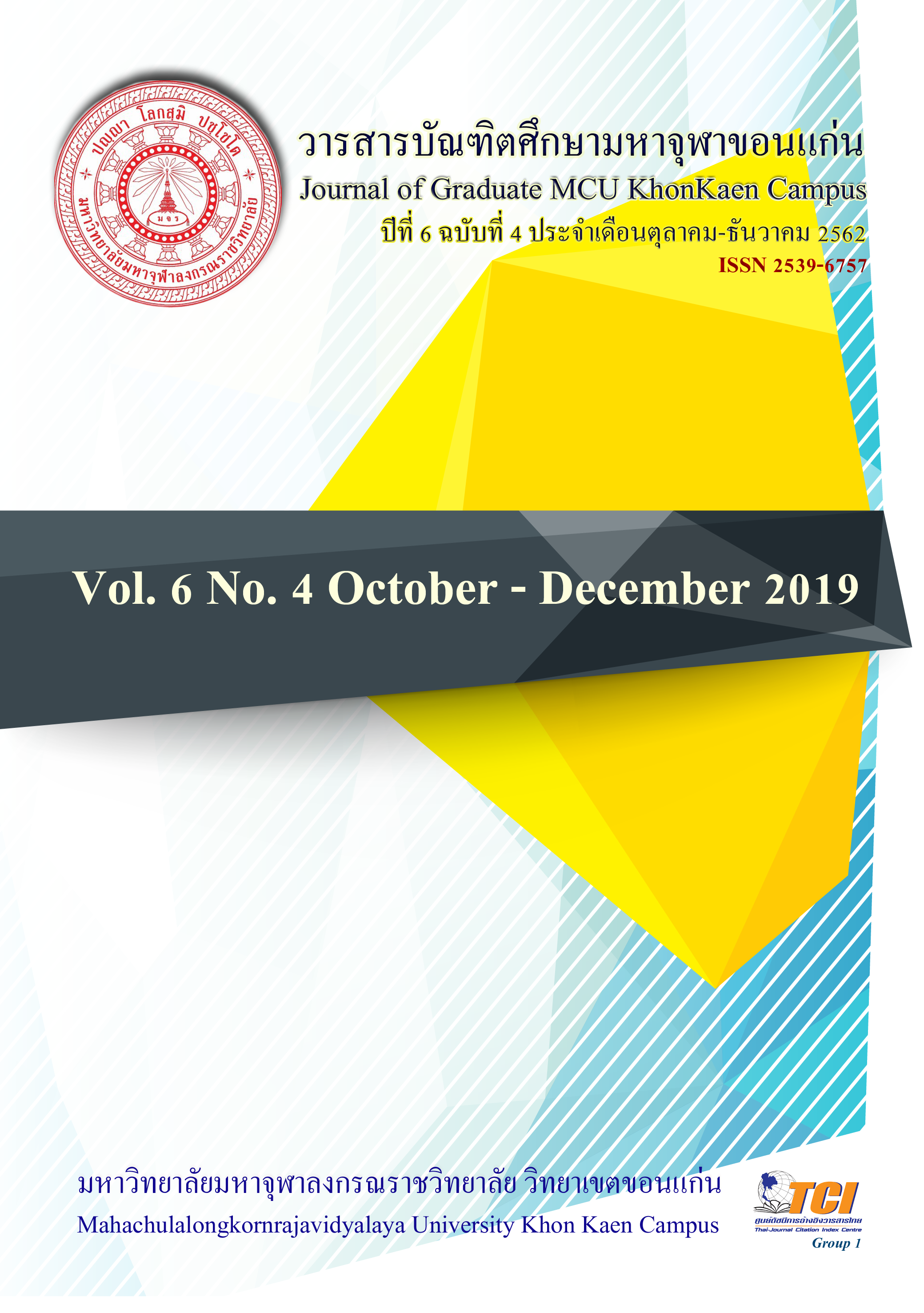การนำแผนยุทธศาสตร์การยกระดับกระบวนการบริหารจัดการภายในสู่การปฏิบัติของคณะสงฆ์จังหวัดนครสวรรค์
Main Article Content
บทคัดย่อ
การวิจัยครั้งนี้ มีวัตถุประสงค์ คือ 1. เพื่อวิเคราะห์ความสอดคล้องของการนำแผนยุทธศาสตร์การยกระดับกระบวนการบริหารจัดการภายในสู่การปฏิบัติของคณะสงฆ์จังหวัดนครสวรรค์กับข้อมูลเชิงประจักษ์ 2. เพื่อวิเคราะห์กรอบความสัมพันธ์เชิงสาเหตุของการนำแผนยุทธศาสตร์การยกระดับกระบวนการบริหารจัดการภายในสู่การปฏิบัติของคณะสงฆ์จังหวัดนครสวรรค์ 3. เพื่อนำเสนอผลการนำแผนยุทธศาสตร์การยกระดับกระบวนการบริหารจัดการภายในสู่การปฏิบัติของคณะสงฆ์จังหวัดนครสวรรค์
ระเบียบวิธีวิจัยเป็นการวิจัยแบบผสานวิธี (Mixed Methods Research) โดยการวิจัยเชิงปริมาณ สำรวจกลุ่มตัวอย่างจากพระสงฆ์ในพื้นที่ 15 อำเภอของจังหวัดนครสวรรค์ จำนวน 420 รูป จากจำนวนพระสงฆ์ทั้งหมด 6,275 รูป เก็บรวบรวมข้อมูลโดยใช้แบบสอบถามซึ่งมีค่าความเชื่อมั่นทั้งฉบับเท่ากับ 0.985 วิเคราะห์ข้อมูลโดยใช้โปรแกรมสำเร็จรูปเพื่อการวิจัยทางสังคมศาสตร์ สถิติพรรณนาที่ใช้ ได้แก่ ค่าความถี่ ค่าร้อยละ ค่าเฉลี่ย และค่าเบี่ยงเบนมาตรฐาน และทดสอบสมมติฐานโดยการวิเคราะห์โมเดลสมการโครงสร้างและการวิจัยเชิงคุณภาพด้วยการสัมภาษณ์เชิงลึก กับผู้ให้ข้อมูลสำคัญซึ่งเป็นผู้ทรงคุณวุฒิ จำนวน 17 รูป/คน โดยใช้แบบสัมภาษณ์ที่มีโครงสร้างซึ่งมีค่าดัชนีความตรงตามเนื้อหาเท่ากับ 1 เพื่อนำมาสังเคราะห์เป็นกรอบความสัมพันธ์เชิงสาเหตุ และประเมินผลด้านความถูกต้องความเหมาะสม ความเป็นไปได้ในการปฏิบัติ และการใช้ประโยชน์ด้วยของผู้เชี่ยวชาญด้านต่าง ๆ จำนวน 8 รูป/คนผลการประเมินอยู่ในเกณฑ์อยู่ในระดับมากที่สุดทุกด้าน เพื่อนำไปพัฒนากรอบความสัมพันธ์เชิงสาเหตุการนำแผนยุทธศาสตร์การยกระดับกระบวนการบริหารจัดการภายในสู่การปฏิบัติของคณะสงฆ์จังหวัดนครสวรรค์ และใช้เทคนิคการวิเคราะห์เนื้อหาเชิงพรรณนา
คำสำคัญ:การนำสู่การปฏิบัติ, แผนยุทธศาสตร์, การยกระดับกระบวนการบริหารจัดการภายใน
ผลการวิจัย พบว่า
- ความสอดคล้องของการนำแผนยุทธศาสตร์การยกระดับกระบวนการบริหารจัดการภายในสู่การปฏิบัติของคณะสงฆ์จังหวัดนครสวรรค์กับข้อมูลเชิงประจักษ์ ในส่วนของกรอบความสัมพันธ์เชิงสาเหตุมีความสอดคล้องกับข้อมูลเชิงประจักษ์ พิจารณาจากค่าสถิติไค-สแควร์ เท่ากับ 32.18, dfเท่ากับ 23, p เท่ากับ .096, GFI เท่ากับ .99, AGFI เท่ากับ .95, RMR เท่ากับ .0086, RMSEA เท่ากับ .031 และค่าตัวแปรทั้งหมดในกรอบความสัมพันธ์เชิงสาเหตุสามารถอธิบายความแปรปรวนได้ร้อยละ 52ซึ่งสนับสนุนว่ากรอบความสัมพันธ์เชิงสาเหตุมีความสอดคล้องกับข้อมูลเชิงประจักษ์
- ความสัมพันธ์เชิงสาเหตุของการนำแผนยุทธศาสตร์การยกระดับกระบวนการบริหารจัดการภายในสู่การปฏิบัติของคณะสงฆ์จังหวัดนครสวรรค์ด้านการทำงานร่วมมือภาคีเครือข่ายให้เกิดสัมฤทธิ์ผล ต้องมีการวางแผนกำหนดยุทธศาสตร์การประชุมชี้แจงการบูรณาการทุกภาคส่วน และการจัดทำกิจกรรมหรือโครงการร่วมกัน ด้านการพัฒนาระบบธรรมาภิบาลต้องมีการวางแผนการทำงานร่วมกัน การรักษาระเบียบวินัยมีความเป็นธรรม และรับฟังความคิดเห็นผู้ที่มีส่วนร่วมด้านการพัฒนาระบบสารสนเทศ 4.0 ต้องมีการจัดทำฐานข้อมูลอย่างเป็นระบบ ส่งเสริมการนำเทคโนโลยีมาใช้ในการปฏิบัติงานนำข้อมูลมาวิเคราะห์และหาแนวทางพัฒนาจัดทำแผนงาน โครงการให้ทันต่อการเปลี่ยนแปลงด้านการพัฒนาหลักสูตรเชิงพุทธและนวัตกรรมให้ทันสมัย ต้องมีการจัดโครงการส่งเสริมนวัตกรรมเชิงพุทธ จัดการศึกษาวิจัย การประกวดส่งเสริมบุคลากรให้ได้รับการศึกษานำเทคโนโลยีมาใช้ในการเผยแพร่ และทุก ๆ ด้านต้องมีการติดตามและประเมินผลการดำเนินงาน
- ผลการประเมินการนำเสนอผลการนำแผนยุทธศาสตร์การยกระดับกระบวนการบริหารจัดการภายในสู่การปฏิบัติของคณะสงฆ์จังหวัดนครสวรรค์ ในภาพรวมของทุกด้าน มีค่าเฉลี่ยอยู่ในระดับมากที่สุด และเมื่อพิจารณาเป็นรายด้านทั้ง 4 ด้าน คือ ด้านการร่วมมือภาคีเครือข่ายให้เกิดสัมฤทธิ์ผล ด้านการพัฒนาระบบธรรมาภิบาล ด้านการพัฒนาระบบสารสนเทศ 4.0 ด้านการพัฒนาหลักสูตรเชิงพุทธและนวัตกรรมวิชาการให้ทันสมัย มีค่าเฉลี่ยอยู่ในระดับมากที่สุดทุกด้าน และมีข้อเสนอแนะเพิ่มในการขับเคลื่อนแผนยุทธศาสตร์ด้วยหลักอารยวัฒิ5 ซึ่งเป็นหลักธรรมที่นำไปสู่ความเจริญอย่างประเสริฐ และใช้หลักสาราณียธรรม 6 ซึ่งเป็นหลักธรรมในการพัฒนาบริหารจัดการองค์กรไปขับเคลื่อนแผนงาน โครงการต่าง ๆ ตามแผนยุทธศาสตร์ในแต่ละด้าน

